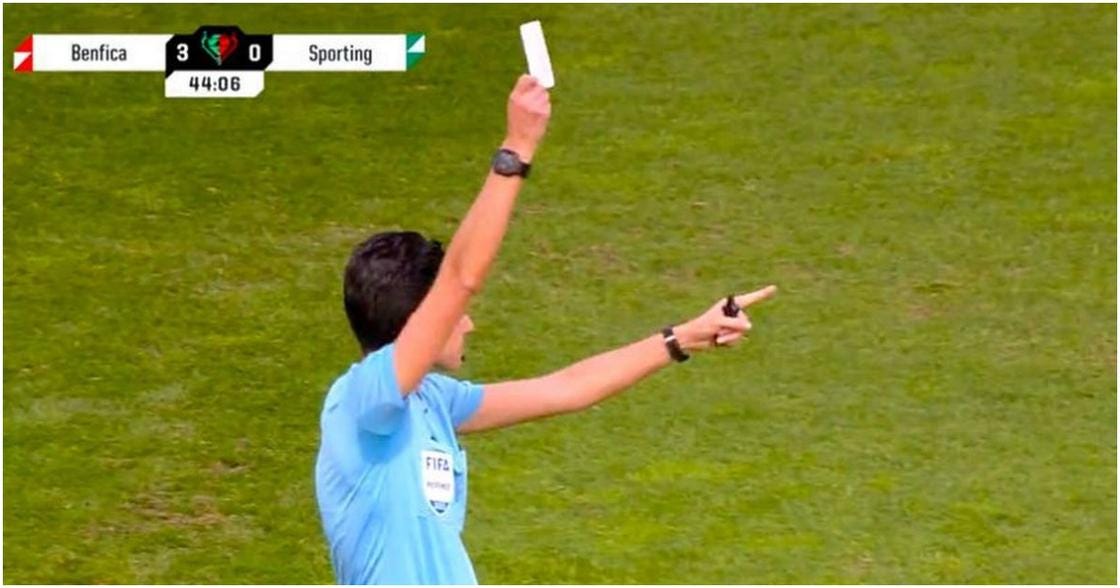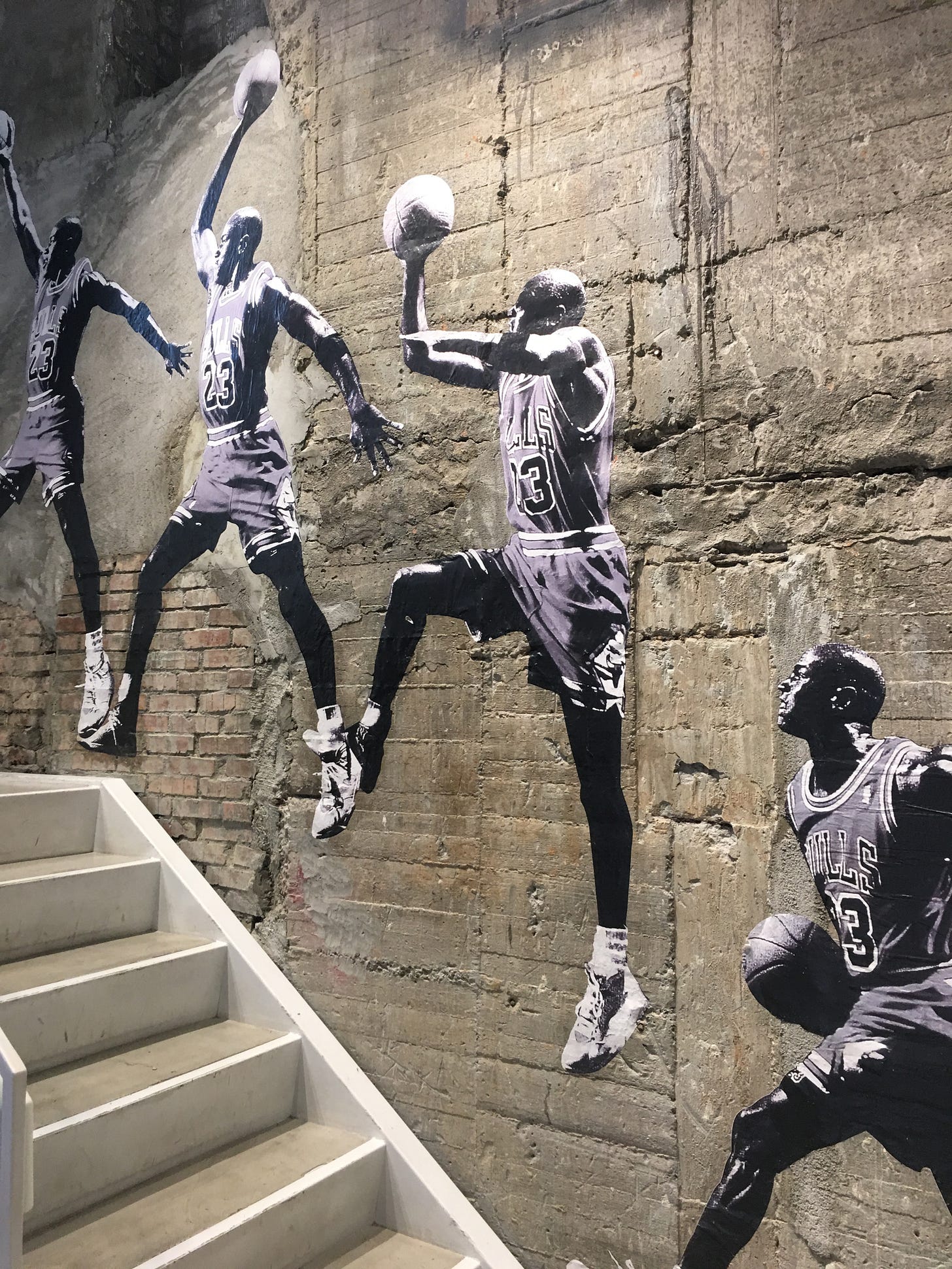Issue.17 - Sportsmanship
Playing within the spirit of the game.
17. Introduction
Hey, someone just pulled a card on you.
Did you do something wrong?
“Who, me?”
Yes player, you.
“How would I possibly know? I only heard an electrifying whistle. What color is the card?“
Well, it depends on what game you are playing. If it is soccer, then it is either yellow (a formal warning) or red. (serious misconduct).
“What are you even talking about? I don’t have time to play games.”
What? Even pets play games. Are you lacking time?
“Who isn’t?”
Are you saying there is a limit to time?
“I’m just saying that I need to turn it into performance.”
As if your life or work is an actual match toward a reward?
“I never really saw it that way…”
Then why does it feel like you are competing?
“I’m not…I kindly ask that you give me some space.”
Jeez, ok. But hey, here, take the white card with you.
17.1 Sports
And sportsmanship.
Earlier this month, Manchester City and Inter Milan competed in Europe’s premier cup competition, and after some good struggle provided by Inter Milan, the Manchester City athletes saluted the much-deserved victory!
As consumers of such a form of entertainment, an important match like this put us in a position to cheer, vibrate, celebrate, suffer, scream, and clench our fists in either anguish or excitement.
Sports nevertheless was considered an artistic expression by the Greeks, which played a significant role in the development and popularization of various athletic competitions. But even ancient civilizations like Egypt, Mesopotamia, China, and Mesoamerica also had their own sporting traditions.
Whether it is because of excitement and action; emotional engagement; skill and athleticism… To cheer for a flag, a team, an athlete, or a score is an act that taps into our inherent human need for identity, belonging, and community. It relates to our social and cultural nature as humans, where we form groups and affiliations based on shared interests, values, and allegiances.
If we think about the role of the athlete, if we try and put ourselves in their positions, some of the players in that cup finals were having a “once in a lifetime opportunity”, some of them will never compete in such high tiers, other might get another chance or two after many years.
During the match, if they miss a play, the weight of the world in the form of guilt goes down on their shoulder, fairly because they owe a diligent performance not only to their teammates but also to their crowd, who all need a victory in order to feel motivated about life even if the whole context is an actual game.
So it makes us wonder, how does an athlete that loses such an opportunity to reach a trophy feel after the loss? What happens to their personal life? Do some of them fail financially? Do some of them get lost in substance abuse? Do some of them loses the motivation to keep pushing to be the best at their craft? Or do some of them find within the loss, an opportunity to learn from their mistakes and weaknesses so that they can be better?
Regardless of the outcomes, these are storylines that repeat themselves in many different sports of many different ages in time.
But something extraordinarily unique happened in soccer some months before the UEFA finals though, and we shall now take a look at it.
17.2 The White Card
And the importance of Fairplay.

Soccer fans are quite used to seeing red and yellow cards throughout games but a very new and rare scene happened in January of 2023, at a female soccer match in Portugal.
The reason why the referee Catarina Campos pushed this iconic white card was the fact that at a given moment in the match, medical personnel from both teams joined forces in order to aid one of the athletes who was feeling unwell.
According to The Mirror, the white card is designed to show recognition to clubs for acts of fair play during a match.
This was a perfect example of the most important and fundamental pillar behind sports: Fair play
A concept that embodies the principles of integrity, respect, and sportsmanship in sports and games. It refers to playing by the rules, demonstrating ethical behavior, and treating opponents, officials, and fellow participants with respect and fairness.
As games, sports are a set of rules and boundaries within a context.
As sports, games are a set of tools chosen to nurture competitiveness.
But when we lose such sense of responsibility toward the health and sustainment of competition, sports, or even life in society, the magic walls of awe are broken and what had the opportunity of being epic clashes of talents, determination, and teamwork can very much become a sad reason for injustice, discontentment, anger, and hatred.
17.3 Determination
And the deep boundless roots of the heart-mind connection.

All this talk takes us to the end subject of this issue, determination.
"The only way to prove that you're a good sport is to lose."
- Ernie Banks
If life was to be a secular-long-span sport or game, what exactly makes the best and most inspiring athletes?
Strangely, I always made a correlation of this question in my mind with the life simulator game The Sims.
As the player, your role in this game is to create a Sim (a virtual person) and go through the many different challenges of life virtually, study, work, build and decorate a house, improve your home appliances, get promoted in your job, go for a swim… The Sims, in fact, has one of the most brilliant UX Writing in gaming.
The catch though is that because it is a game, it is very easy for players to open the console, type the cheat code “motherlode" and instantly get 50.000 simoleons (the game currency).
Skipping the hard part and going right to the buy mode in order to pick whatever they want feels rewarding at first but in the long term, it ruins the experience of the game which will probably get boring faster.
This example doesn’t really regard losing or winning but precisely skipping the learning process, which has the capacity to carry unmeasurable debts for a journey.
Skipping or avoiding the uncomfortable parts of a journey is the one thing that separates the true resilient athlete from the athlete who gave up on their capacity to further improve and embrace new horizons.
Adversity is a constant present in the life of every single person, it comes in different forms, waves, and impact. It is the true mother and father of the personal development of every character but it is not something that can be predicted.
This essentially means that it is crucially important for any student to be critical in regard to who they learn with because true experience, fallacy, opinion, and wisdom are all concepts that thread a thin line of information.
Disregarding important advice from our parents or those who already faced particular challenges in life is as counterproductive as listening to the advice of people who never really faced relevant adversities and still feel entitled to teach a path while not truly knowing anything about the obstacles it pertains to.
The true formula to develop your determination could be considered even “journalistic”. First and foremost stick to your own research, then co-relate opinions, experience, and facts from multiple sources, next stay close to those who cultivate a creative energy of love and hope that results in novelty, and finally stay even closer to those who are always equipped with a new book because true advice feels as fresh as a drop of water in the desert, precisely because it resides in fair play and it will never really need to bitterly criticize or exclude something in order to prove a point.
About the Author
Thiago Patriota
Made in 1996. Born & Raised Brazillian. Bachelor’s Degree in Advertising and Communication. Adept to autodidactism. Curious Soul. Published Author. Founder of Sentient.
That’s me in a nutshell but you can learn more about Agency and myself on the About page!






Fantastic post 👏